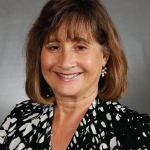Q: If you could change one thing about the field of rheumatology, what would it be?
A: More providers! The workforce shortage is a real problem and certainly affects access to care.
ARHP Distinguished Clinician Award
 Carole Dodge, OTRL, CHT
Carole Dodge, OTRL, CHT
Clinical Specialist and Supervisor, Occupational Hand Therapy Program, Michigan Medicine, Ann Arbor, Mich.
Background: Be patient. It’s a mantra that’s served Ms. Dodge well after a nearly 40-year career of watching patients and their occupational therapists (OT) struggle to reach their goals.
“At times, we get frustrated when people don’t progress as quickly as we’d like,” she says. “And it’s not necessarily their fault. It can be a physical limitation. We get hard on ourselves we because we feel we should be able to do something to help them. I always say, “Be patient.” You may feel you’re at a plateau or you’re stuck, but give it a little bit more time. Keep doing the things we know work. And they will.”
Ms. Dodge earned her bachelor of science in occupational therapy from Boston University in 1979, and then received her credential as a certified hand therapist in 2007. Her areas of specialty include rheumatoid and osteoarthritis, as well as scleroderma.
She helped develop an Occupational Therapy Hand Fellowship program at Michigan Medicine, the first hand fellowship program accredited by the American Occupancy Therapy Association in 2013. She’s now director of the residency program.
Ms. Dodge has been active in the ARHP since 1994.
Q: How satisfying is working on skills you know are vital for patients’ activities of daily living?
A: There’s not a day I don’t look forward to coming to work because I know if I see one patient or I see 10 patients, I’m going to make a difference in people’s lives. Helping them problem-solve one activity they can do … is a reward in itself. It motivates you.
Q: How do you recruit the next generation of occupational therapists?
A: We created our [fellowship] program because we saw a gap. The need was there, but the therapists weren’t being developed, or developed in a way we thought was needed to really educate the next generation, and many generations. We’ve already had 20 graduates from our program, and it’s not only helped us have more qualified staff, but almost every graduate we’ve had has had a job upon leaving our program.
Q: What’s the role of occupational therapy in five, 10 years?



